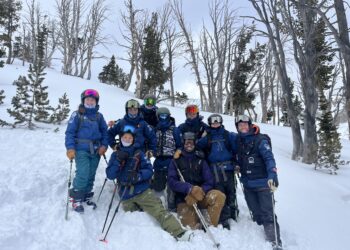By Bay Stephens EBS Staff Writer
BIG SKY – In the third annual Resort Tax Summit, members from Montana’s various resort tax areas and communities convened on Nov. 30 in the Big Sky Resort Area District office to discuss shared challenges in sharing short-term rental data from the state and fair tax remittance from businesses operating within their boundaries.
Attendants included resort tax members from Gardiner, West Yellowstone, Whitefish, Virginia City, and Red Lodge, as well as Big Sky resort tax board members.
A common thorn in the side of these resort tax areas and communities is that, although they provide lists of known short-term rentals in their respective resort tax boundaries, the state doesn’t share their lists of the same data, which would allow the resort tax areas and communities to cross reference and ensure short-term rental owners are remitting their share of resort tax.
“This seems to be something we’re all facing,” Big Sky resort tax chairperson Kevin Germain said. “One thing I can’t believe is that we can’t share information with the state and get information back …” While the state can use the information to collect lodging tax from VRBO-type rentals, the resort tax entities must develop their own lists, often through paying for services such as STR Helper or MUNIRevs, which help ensure short-term rental compliance with local tax laws.
In June, Montana and Airbnb reportedly entered into an agreement in which the rental organization will collect lodging sales tax from guests and remit them to the state, according to the Great Falls Tribune. Although the state is protective of lodging tax, Big Sky resort tax vice chair Steve Johnson said they don’t appear concerned about resort tax compliance throughout the state.
“I think there’s little education on what resort tax is and what we bring to the state in some regards,” said Whitney Brunner, the operations officer for Big Sky resort tax, adding that the resort areas and communities had been excluded from the state’s negotiation process with Airbnb.
In Big Sky, short-term rentals have significantly exacerbated the affordable housing shortage, taking long-term rentals off the market, restricting supply and driving up long-term rental rates, in turn hindering a readily available local workforce. According to Brunner, MUNIRevs has mapped over 1,000 short-term rentals at different times of year in the Big Sky area.
“The impact [of short-term rentals] on affordable housing for our workforce is tragic,” Johnson said. “I think we’re all saying that.”
Short-term rentals that do not remit resort tax in Big Sky also gain an unfair advantage over other lodging enterprises and diminish collections direly needed in the burgeoning resort area.
The group chorused a general frustration with the state’s lack of transparency.
“Show us the law that you can’t pass [short-term rental information] down to us, because that’s what I want to see,” said Dana Smith of the city of Whitefish resort community. “Where does it state that you can’t get a list of business name[s] and the contact info?” This information would allow the resort areas and communities to seek out short-term rental owners to ensure they are remitting the resort tax.
Through the toolbelt it has as an incorporated municipality, Whitefish has been able to use STR Helper software to track down and register around 100 short-term rentals, requiring that owners acquire a business license and for every unit they run. According to Whitefish city manager Adam Hammatt, they were able to zone portions of the city to allow short-term rentals and other areas to not, aiming to incentivize homeowners to convert their accessory dwellings into long-term rentals.
On multiple fronts the resort tax representatives found commonalities and expressed interest in more serious collaboration in order for their voice to be heard at the state level.
The group may attempt to influence the state to allow resort areas and communities the option to tax an additional 1 percent on luxury goods and services. From there, constituents would be able to vote to approve a 1 percent resort tax increase in their respective resort area or community. Summit attendees agreed that 3 percent does not effectively represent the impacts tourists have on infrastructure.
Workforce housing update: Meadowview construction delayed two weeks, Applicant list is short
Laura Seyfang, program director of the HRDC’s Big Sky Community Housing Trust, shared with the Big Sky resort tax board that construction for the Meadowview project has been slightly delayed, now with an estimated completion in late April.
There will now be a two-part closing between the developer and the HRDC, the first portion for the land in mid-December, which would fund continued construction without further delays. The second would be after the property’s final plat.
“We probably lost about two weeks with this negotiation process but we’re still forecasting now that the first units will be completed at the end of April, whereas before we were hoping for earlier in April,” Seyfang said.
Mike Scholz explained that releasing the funds early is within the contract between the HRDC and resort tax, requiring no formal action from the board.
Seyfang also shared that the list of applicants to subsidized housing in Big Sky is short, with 32 qualified individuals as of Nov. 30. She and the community housing trust council are encouraging individuals in need of subsidized housing to take the homebuyer’s education class through the HRDC—a prequalification to getting on the list—even if they don’t think the incoming Meadowview units will fit their specific needs as the list will carry over into other workforce housing projects in the future
After reviewing the list of applicants with some resort tax board members, the HRDC is also considering adjusting pricing and subsidy level based on income, potentially offering units at different price levels, Seyfang said.














